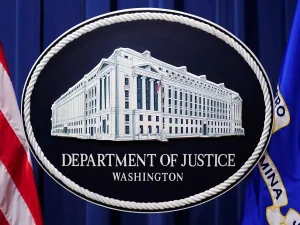
Costa Tropical Internet
Just another WordPress site
The Justice Department reached a settlement with two former FBI officials, Peter Strzok and Lisa Page, who were implicated in a controversy involving anti-Trump text messages. The pair was heavily scrutinized in 2017 when their private texts, which exhibited bias against then-presidential candidate Donald Trump, were publicly disclosed, fuelling accusations of partisan bias within the FBI. The settlement follows a protracted legal battle, where Strzok and Page contended that the disclosure of their texts violated their privacy rights.
As part of the settlement, the Justice Department admitted that the public release of the messages did not align with the agency’s usual practices or its privacy policy, while refraining from admitting liability. The terms of the settlement also include financial compensation for Strzok and Page. This incident underlines the importance of neutral conduct among officials in key governmental agencies, to prevent undermining public trust in these institutions. The case also underscores the privacy rights of government employees and the potential repercussions of violating these rights.

Settlement details refer to the explicit stipulations, terms, and conditions involved in resolving a dispute between two or more parties. These details are meticulously outlined to ensure clarity, fairness, and adherence to the arrangement by all parties involved. They are most commonly used in various professional contexts such as business contracts, insurance claims, and dispute resolutions. The terms and conditions of a settlement detail not only define the roles and responsibilities of each party but also lay out the consequences if any party fails to fulfill their obligations.
The content of these terms and conditions is often tailored to the specific circumstances surrounding the dispute at hand. This can include factors such as the nature of the disagreement, the number of parties involved, and the potential ramifications of the settlement. The details may stipulate the specific actions required by each party, the timeline for these actions, and any monetary or non-monetary compensation to be given.
A careful review of these terms and conditions is crucial before any agreement is reached. Each party should have a clear understanding of what they are agreeing to and be prepared to fulfill their obligations under the settlement. This is why it is often recommended for parties to seek guidance from professionals who are adept in handling such matters.
Confidentiality is another critical aspect of many settlement details. Often, parties are required to maintain discretion about the terms of the settlement and the circumstances surrounding it. Any violation of this confidentiality can lead to additional consequences as outlined in the settlement details.
In conclusion, settlement details: terms and conditions revealed serve as a comprehensive guide for all parties involved in a dispute resolution. They provide a clear roadmap for resolving disagreements, ensuring compliance, and maintaining fairness throughout the process.
The issue of controversial text messages has been a contentious topic in modern society. Primarily, this is due to the fact that these messages can cause significant harm and impact, both on a personal and a broader social level. The controversy arises from the nature and content of these messages, often laden with offensive, discriminatory or harmful language. The impact of such messages is far-reaching. For individuals, they may lead to emotional distress, anxiety, and a sense of violation. Moreover, they can result in damage to reputation and relationships, affecting both personal and professional lives. On a larger scale, they can instigate societal discord, promoting harmful stereotypes and fostering an atmosphere of hostility.

This situation is further complicated by the rise of digital communication where messages can be shared instantly, making it easier for them to proliferate. Consequently, the potential for damage is greatly increased. The extensive use of texting and online messaging in today’s technological society makes this a pressing issue. Matters related to privacy, freedom of speech, and the potential for misuse or abuse of digital communication platforms are all intertwined in this controversy. It is a complex issue that requires careful consideration, with a balance needing to be struck between protecting individuals and maintaining the openness and ease of communication that technology provides. As societies continue to grapple with these issues, it is clear that the conversation around controversial text messages and their impact will remain a hot topic for the foreseeable future.
Key figures and political leaders worldwide often express their views in response to significant incidents, policies, or decisions. These reactions can greatly influence public opinion and can shape the course of future actions. They come in the form of speeches, interviews, social media posts, and official statements, reflecting their perspectives, ideologies, and the interests of those they represent. For instance, the responses of world leaders to climate change vary dramatically, with some acknowledging it as an urgent global crisis that needs immediate action, while others dismiss its severity or even deny its existence.
Similarly, their reactions to technological innovations, such as artificial intelligence, may range from enthusiastic support to cautious skepticism. These responses can impact the direction of research, funding, and public acceptance of new technologies. In times of international conflict or humanitarian crises, leaders’ reactions can either escalate the situation or facilitate peaceful resolutions. Their responses can also signal their stance on human rights, equality, and justice without explicitly stating the legalities. Political leaders and key figures’ reactions are not just mere words; they are powerful tools that can sway public sentiment, shape policy direction, and trigger significant change on a global scale. Therefore, it is crucial for the public to critically evaluate these reactions and the motivations behind them.

Legal implications and future precedents are pivotal in shaping the societal landscape. These concepts revolve around a system of rules, which are established and enforced by a governing authority to regulate behavior. Legal implications refer to the consequences or outcomes that can ensue when these said rules are either adhered to or violated. These outcomes may be either beneficial or detrimental, depending on the nature of the action and the corresponding rule in place.
On the other hand, future precedents are scenarios or cases that set a standard for how similar situations should be approached in the future. They are often established when a governing authority makes a decision on a unique or unprecedented case. Once set, these precedents can greatly influence future decision-making in similar cases, ensuring consistency and fairness. These precedents can also prompt changes or modifications to existing rules, thereby refining and improving the system over time.
This dynamic between legal implications and future precedents establishes a continually evolving structure that adapts to societal changes. However, this also presents challenges. For instance, the creation of a precedent may not always lead to a beneficial outcome, and could potentially result in unfavorable implications if not carefully considered. Additionally, as societies become increasingly complex and diverse, determining the appropriate implications and establishing fair precedents can become more difficult.
Therefore, it is crucial for governing authorities to exercise discretion and prudence in these matters. They must carefully consider the potential outcomes and future effects of their decisions, ensuring they align with societal values and principles. In this way, the system of rules can continue to effectively regulate behavior, promote fairness, and adapt to societal changes, thereby upholding the stability and integrity of society.